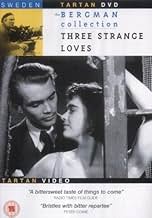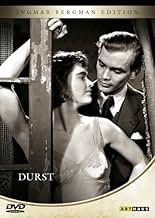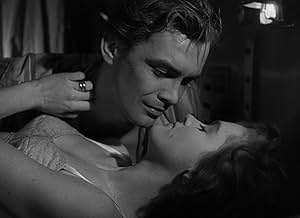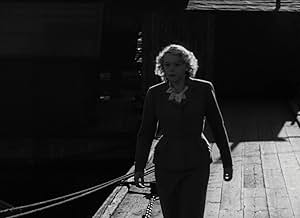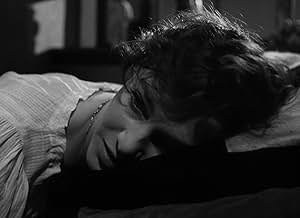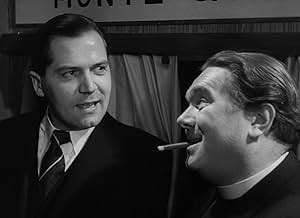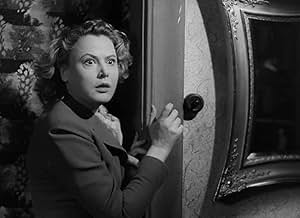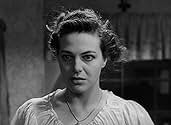IMDb RATING
6.5/10
3.1K
YOUR RATING
A needy couple in a bad marriage travel back to Stockholm after a trip to Italy. Meanwhile, a widow resists seductions from two different persons - her psychiatrist and a lesbian friend.A needy couple in a bad marriage travel back to Stockholm after a trip to Italy. Meanwhile, a widow resists seductions from two different persons - her psychiatrist and a lesbian friend.A needy couple in a bad marriage travel back to Stockholm after a trip to Italy. Meanwhile, a widow resists seductions from two different persons - her psychiatrist and a lesbian friend.
- Director
- Writers
- Stars
Mimi Nelson
- Valborg - Ruts kamrat i balettskolan
- (as Mimmi Nelson)
Inga-Lill Åhström
- Balettskolepianisten
- (uncredited)
Wiktor Andersson
- Doorkeeper
- (uncredited)
Verner Arpe
- Tysk biljettsamlare
- (uncredited)
Ingmar Bergman
- Tågpassagerare
- (uncredited)
Britta Brunius
- Sjuksköterskan efter Ruts abort
- (uncredited)
Calle Flygare
- Den danske prästen på tåget
- (uncredited)
Inga Gill
- Lady at Hotel
- (uncredited)
Herman Greid
- Stadsbudet i Basel
- (uncredited)
- Director
- Writers
- All cast & crew
- Production, box office & more at IMDbPro
6.53K
1
2
3
4
5
6
7
8
9
10
Featured reviews
Very interesting early Bergman movie
True, the movie has got a few flaws, mostly in the construction; the structure lacks necessity and the flashbacks appear a bit randomly, it seems. However, the essential Bergman is already present (it's 1949): a few absolutely superb close-ups on the main characters' faces, the way people suddenly appear on camera, from unexpected angles, etc. And Bergman is already displaying some of the themes he will use constantly : the train travel, war and ruins as a background for difficult relationships, plus of course the impossibility and at the same time the inevitability of the relationship between man and woman : it's doomed, but there's no other way... In fact, the French title is "La fontaine d'Aréthuse", which points to this very idea. Precisely, I'd like to discuss another point : the original title is "Thirst". And in fact, people in the movie drink a lot : wine, beer, milk, or fail to drink : in a dramatic moment, one character refuses to drink coffee, tea is prepared, but doesn't taste good. I believe people never drink water, but water (the sea) is the backdrop for the happiest moment of the movie and the most desperate (with the suggestion of a suicide). For Bergman, I believe, Man is essentially thirsty, is desperately thirsty for something to calm and comfort him. But the world is hostile, relationships can offer only brief moments of satisfaction on a backdrop of tension and pain. Other comments on this title ? Very interesting movie overall.
Well written and acted early Bergman
While Ode to Joy is undoubtedly the gem of Eclipse's Early Bergman box set, Thirst is a close second, at least in my mind. It's kind of a precursor to Scenes of a Marriage, where the story follows a married couple (played by Eva Henning and Birger Malmsten) on a train trip through war-torn Europe. The tumult of the film comes not from the mostly ignored outside world, but from the rocky marriage itself. We also get glimpses of the couple's former lovers. The film is at its best when sticking to the couple. When it strays to the stories of side characters, it's weaker. Since the film is so short (just over 80 minutes), you have to wonder if some of the tangential stories were added as padding. But even the scenes that don't add much are well written, acted and directed. Henning gives a masterful performance, and Bergman was really coming into his own by this point.
Long Live the Marriage!
Women on the verge of a nervous breakdown, men looking for dominance, acted out on a small scale: Here, Bergman serves up some technical and contentual elements which can be found throughout his later career. Several short stories written by Birgit Tengroth, who is playing Viola here, are melded, with the main plot involving Rut (Eva Henning) and Bertil (Birger Malmsten). But as soon as the couple arrives the train which will take them on a journey through Europe, Bergman somehow loses all side threads. One can sense how the director exerts to stage his idea of a marital- and love drama, though, it soon appears as a pretty faint attempt and at the end all plot lines remain fragmentarily. The characters and the images, however, linger. They tell the underlying story of Törst and convey this certain feeling of freedom, self-determination, and desire for love presented in a "steely, self-assured, stripped-down directorial style" which is Bergman's very own. That is why with this film one can expect something in the subsequent films of this yet young talent: a great subtlety in cinematic character psychology and lasting, poignant images.
Bergman continues to evolve, but he's not there yet
The early Bergman films are interesting in how they portray an artist evolving with increased experience. They're not always successful artistic endeavors overall, but they show how a studio system can foster and hone talent through experience.
Thirst tells the story of a young married couple on their way back from a vacation in Italy. We see them in France as they are about to board a train through 1946 Germany back towards Sweden. The woman is haunted by a previous affair and a subsequent abortion all while she nurses a bad knee in the hopes that one day she will dance ballet again. The husband is a penny pinching academic obsessed with coins and who had had an affair with another woman out of, what he calls, pity for her status as a widow. None of this is a secret, all of the sins are out in the open.
The two have the kind of talks typical in Bergman films (in particular his later, post-existential films like Scenes from a Marriage) and come to the conclusion that they should reconcile their differences and try to work through their problems to a happy marriage in the film's final moments.
The problem with the movie is its structure. This could be a case study in a poorly structured story pretty much killing a film. The first twenty minutes are dedicated to flashbacks to the wife's affair with a lieutenant in the Swedish military before we ever meet the husband. The husband's lover is first mentioned about thirty minutes into the movie, and she is introduced a few minutes later in a scene with her cruel psychologist. She then disappears for a half hour. There's also the wife's old dancing friend who appears in another flashback and then shows up with the husband's former lover, trying to seduce her which ends up leading to the lover's suicide.
The problem isn't the events themselves, but the fact that they are bunched together without any real effort to weave it in and out of the other threads. As typical, I read the essay in the Criterion Collection's large book and was unsurprised to discover that the script (which Bergman didn't write) was based on a series of short stories. Considering my issues with the film's structure, it made perfect sense. It felt very staccato with one story going through its beginning, middle, and end before another one took over. It's not quite that, but, especially considering the initial twenty minutes with the wife's lover, it feels very apropos.
I do think that if the movie had been re-arranged it would have worked better. I don't think it's something that purely an editing job would have done. At least some of it would have needed to originate at the script. The husband's lover needed at least one more scene to flesh her out for instance (her first scene with the psychologist is highly emotionally delivered and feels out of place because we had never met her before).
Stylistically, the movie feels very Bergman. The topics he loved are there (the marriage, even the dancer is a performer that he frequently featured). His visual style sometimes feel a little more active than normal, but we clearly see his visual tics such as two people in frame talking to each other, letting actors demonstrate who they are through long exposures to their smaller actions, and strong performances throughout. I just wish the story had been arranged in a way that made sense.
Thirst tells the story of a young married couple on their way back from a vacation in Italy. We see them in France as they are about to board a train through 1946 Germany back towards Sweden. The woman is haunted by a previous affair and a subsequent abortion all while she nurses a bad knee in the hopes that one day she will dance ballet again. The husband is a penny pinching academic obsessed with coins and who had had an affair with another woman out of, what he calls, pity for her status as a widow. None of this is a secret, all of the sins are out in the open.
The two have the kind of talks typical in Bergman films (in particular his later, post-existential films like Scenes from a Marriage) and come to the conclusion that they should reconcile their differences and try to work through their problems to a happy marriage in the film's final moments.
The problem with the movie is its structure. This could be a case study in a poorly structured story pretty much killing a film. The first twenty minutes are dedicated to flashbacks to the wife's affair with a lieutenant in the Swedish military before we ever meet the husband. The husband's lover is first mentioned about thirty minutes into the movie, and she is introduced a few minutes later in a scene with her cruel psychologist. She then disappears for a half hour. There's also the wife's old dancing friend who appears in another flashback and then shows up with the husband's former lover, trying to seduce her which ends up leading to the lover's suicide.
The problem isn't the events themselves, but the fact that they are bunched together without any real effort to weave it in and out of the other threads. As typical, I read the essay in the Criterion Collection's large book and was unsurprised to discover that the script (which Bergman didn't write) was based on a series of short stories. Considering my issues with the film's structure, it made perfect sense. It felt very staccato with one story going through its beginning, middle, and end before another one took over. It's not quite that, but, especially considering the initial twenty minutes with the wife's lover, it feels very apropos.
I do think that if the movie had been re-arranged it would have worked better. I don't think it's something that purely an editing job would have done. At least some of it would have needed to originate at the script. The husband's lover needed at least one more scene to flesh her out for instance (her first scene with the psychologist is highly emotionally delivered and feels out of place because we had never met her before).
Stylistically, the movie feels very Bergman. The topics he loved are there (the marriage, even the dancer is a performer that he frequently featured). His visual style sometimes feel a little more active than normal, but we clearly see his visual tics such as two people in frame talking to each other, letting actors demonstrate who they are through long exposures to their smaller actions, and strong performances throughout. I just wish the story had been arranged in a way that made sense.
Interesting Early Product
Bergman is beginning to develop some of his personal traits to be found in the later, more mature film. He hasn't yet learned to unveil the characters quite yet but the interactions are quite interesting. There are several stories going on here and a couple of groups of characters and sometimes the switching back and forth can be confusing. I would certainly agree with one reviewer that "thirst" was used not only metaphorically throughout but quite literally from the first image of an eddy of water during the credits to the very end. The characters are always drinking something or other - water (it's midsummer after all), wine(one of the characters is an alcoholic), even milk. The characters are actually quite self-centered, as in so many of Bergman's earliest films, and not particularly likable. The scene with the "therapist" was especially disturbing and the characters seem more prone to bounce off each other than anything. It's when they start to communicate that the trouble really begins to brew as we've learned from the later films.
Curtis Stotlar
Curtis Stotlar
Did you know
- TriviaThe first of three theatrical films directed by Ingmar Bergman that he did not write.
- Alternate versionsThe Tartan region 2 DVD restores the ending of the scene between Viola and her lesbian former schoolmate Valborg, in which the latter tries to seduce the former by getting her drunk. This had been cut by the Swedish censors before the film's original release and had never been seen publicly before 2004.
- ConnectionsReferenced in Dårskapens hus (1951)
- SoundtracksNon più andrai
(uncredited)
from "Le nozze di Figaro"
Music by Wolfgang Amadeus Mozart
Swedish Lyrics by Bernhard Crusell
Sung by Bengt Eklund
- How long is Thirst?Powered by Alexa
Details
- Runtime
- 1h 23m(83 min)
- Color
- Aspect ratio
- 1.33 : 1
Contribute to this page
Suggest an edit or add missing content

